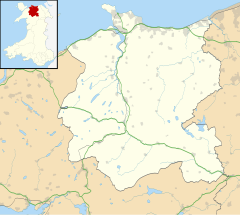
Abergele

| Abergele | |
|---|---|
 Abergele from Tan-y-Gopa | |
Location within Conwy | |
| Population | 10,577 (2011) |
| OS grid reference | SH945775 |
| Community |
|
| Principal area | |
| Preserved county | |
| Country | Wales |
| Sovereign state | United Kingdom |
| Post town | ABERGELE |
| Postcode district | LL22 |
| Dialling code | 01745 |
| Police | North Wales |
| Fire | North Wales |
| Ambulance | Welsh |
| UK Parliament | |
| Senedd Cymru – Welsh Parliament | |
Abergele (Welsh: [ˌabɛrˈɡɛlɛ]; ⓘ) is a market town and community, situated on the north coast of Wales between the holiday resorts of Colwyn Bay and Rhyl, in Conwy County Borough and in the historic county of Denbighshire. Its northern suburb of Pensarn lies on the Irish Sea coast. Abergele and Pensarn railway station serves both resorts.

Etymology
The meaning of the name Abergele can be deduced by aber being the Welsh word for estuary, river mouth or confluence and Gele the name of the river which flows through the town. Gele is a dialectal form of gelau, which means spear, describing the action of the river cutting through the land.[citation needed]

Geography


The town itself lies on the A55 road and is known for Gwrych Castle.[citation needed] The highest hill is Moelfre Isaf (1040 ft) to the south of the town.

There are views from Cefn-yr-Ogof (669 ft), Gallt-y-Felin-Wynt (Tower Hill) (587 ft) and Castell Cawr (known locally as Tan y Gopa and nicknamed 'Lôn garu' (Lover's Lane)) which is 189 metres (620 feet). Castell Cawr is an Iron Age hillfort, one of several in the area. Dinorben hillfort to the east of town was destroyed in the 1980s.

Abergele (including Pensarn) has a population of around 10,000[1] and is part of the Abergele/Rhyl/Prestatyn urban area with a population of 64,000. [citation needed] The town has satellite villages such as Saint George, Betws yn Rhos, Rhyd-y-foel, Belgrano, Llanddulas and Llanfair Talhaearn.

Pensarn and Belgrano have less people identifying as Welsh than the rest of town, with 69.3% of people not identifying as Welsh in the 2011 census.[2][3]

History


"I have observed, at low-water, far from the clayey banks, a long tract of hard loam, filled with the bodies of oak trees, tolerably entire; but so soft as to be cut with a knife as easily as wax. The wood is collected by the poorer people, and after being brought to dry upon the beach, is carried home and used as fuel; but, in burning, it emits a very bad smell."

Celtic and early Welsh history
Abergele was the site of an important clas (Celtic monastery) and remained settled into the 13th century. A "Prince Jonathan of Abergeleu" is listed by the B text of the Annals of Wales as dying during the 9th century reign of Rhodri the Great,[5] although Charles-Edwards has supposed him to have simply been the monastery's abbot.[6] Edward I is known to have briefly stayed there in December 1294 during his invasion of Wales to suppress the revolt of Madog ap Llywelyn.

Sites of historical interest include two Iron Age hillforts; Castell Cawr at Tan y Gopa and Dinorben (now virtually disappeared owing to limestone quarrying) at St. George. On Gallt y Felin Wynt, a hill above the town known as Bryn Tŵr or by its English name 'Tower Hill', is a 17th-century windmill, partially restored in 1930. There is another Iron Age fort at Pen y Corddyn Mawr hill above Rhyd y Foel. There is also another watchtower, 'Tŵr Arglwyddes Emily' or 'Lady Emily's Tower', which is located near Cefn yr Ogof.

Gwrych Castle
Gwrych Castle was built between 1819 and 1825 at the behest of Lloyd Hesketh Bamford-Hesketh. From 1894 until 1946 it was the residence of the Dundonald family.[7] Gwrych Castle's present owner, California businessman Nick Tavaglione, who bought the landmark in December 1989, put Gwrych up for auction on 2 June 2006, but it failed to sell. The condition of the property is being monitored by the Gwrych Castle Preservation Trust.[8] It is undergoing renovation.

The boxers Bruce Woodcock (in the late 1940s)[9] and Randolph Turpin (in 1952)[10] trained at Gwrych Castle. The film Prince Valiant, was filmed there in 1996, starring Edward Fox and Katherine Heigl.[11][12]

St. Michael's Parish Church
In a Welsh antiquarian book from 1860, it mentions that there has always been a 'local tradition or popular opinion that the original Abergele was overwhelmed by the sea' and that an inscribed stone at St Michael's parish church (built on the site of the old clas) which was once readable but had been weathered over time read;

Although through oral tradition, the elders believed that the weathered stone was a modern copy of the original which could be found on the other side of the wall which was far more weathered and illegible. In 1890's, a third (bilingual) copy was made and presented by Mrs Taylor of Dolhyfryd and the vicar, David Evans. The updated inscription (with slightly altered text) on the tombstone reads in order:

"YMA MAE'N GORWEDD YN MONWENT MIHANGEL WR OEDD A'I ANNEDD DAIR MILLTIR I'R GOGLEDD"

"HERE LIETH IN ST. MICHAEL's CHURCHYARD A MAN WHO HAD HIS DWELLING THREE MILES TO THE NORTH"

As the sea is little more than half a mile away at this point, this suggests that the sea has made some considerable advance over the centuries.[13][14]

Outside the church is a penitential stone where sinners had to do penance by standing, dressed in white, by the stone and beseech the congregation for mercy as they entered and left the church.[15]

Railway disaster
In 1868 the railway line through Abergele was the site of the worst railway disaster in Britain to that time. The result of a series of circumstances, errors and failures led to loose wagons containing barrels of paraffin, detached from another train at nearby Llanddulas, rolling down towards Abergele. The Irish Mail train from Euston to Holyhead ran into them. Its leading coaches were enveloped in flame which burned occupants alive. In all 33 people died.[16][17][18]

An inquest was held a few days after and ran until early September of the same year. It concluded that it was no accident and that the two brakesmen of the goods train to which the petroleum wagons had previously been attached were to blame, and the deaths were manslaughter.[16][19]

Other
Abergele Sanitorium was built just outside Abergele in 1910;[20] it became a community hospital in the 1980s.[21]

On 30 June 1969, the evening before the Investiture of the Prince of Wales in Caernarfon, two members of Mudiad Amddiffyn Cymru (Welsh Defence Movement), Alwyn Jones and George Taylor, were killed when the bomb they were planting outside government offices exploded prematurely.[22]

In 2020 Abergele hosted the 20th edition of I'm a Celebrity...Get Me Out of Here! at Gwrych Castle, and in 2021 it hosted the 21st series due to the Covid pandemic restrictions in Australia.[23]


Notable people
- Felicia Hemans (1793–1835), English poet who grew up at Abergele and later identified herself as 'Welsh by adoption'.
- Lloyd Hesketh Bamford-Hesketh (1788–1861), owner of the Gwrych Castle and High Sheriff of Denbighshire in 1828.
- Emrys ap Iwan (1848–1906) a Welsh literary critic and writer on politics and religion.
- Aylward M. Blackman (1883–1956 in Abergele) Egyptologist, excavated sites in Egypt and Nubia
- Mervyn Roberts (1906–1990), a Welsh composer, known for his piano music.
- Ralph Steadman (born 1936), illustrator, best known for his collaboration with the writer Hunter S. Thompson.
- David Vaughan (born 1983), footballer with 476 club caps and 42 for Wales
- Georgia Wilson (born 1995), paralympic equestrian
- Jesu, experimental metal band
References
- ^ Office for National Statistics : Census 2001 : Parish Headcounts : Conwy, archived from the original on 29 August 2012, retrieved 8 November 2010
- ^ Pensarn national identity, neighbourhood statistics, retrieved 14 December 2014
- ^ UK Census (2011). "Local Area Report – Abergele Parish (W04000105)". Nomis. Office for National Statistics. Retrieved 7 January 2020.
- ^ "Tours in Wales with Notes by Thomas Pennant Edited by John Rhŷs' - Printed and Published by H. Humpphreys (Caernarfon)'". 1883 – via Internet Archive.
- ^ The Annals of Wales (B text), p. 10.
- ^ Charles-Edwards, T.M. "The Heir-Apparent in Irish and Welsh Law". Celtica, Vol. 9, p. 180–90. Dublin Institute for Advanced Studies, 1971. Accessed 27 Feb 2013.
- ^ A brief history of Gwrych Castle, Gwrych Castle Preservation Trust, archived from the original on 28 February 2009, retrieved 14 March 2009
- ^ What is the Castle Trust?, Gwrych Castle Preservation Trust, archived from the original on 18 February 2009, retrieved 14 March 2009
- ^ "Terrified Doncaster boxer fled from 'ghost' at new I'm a Celebrity castle". 4 September 2020.
- ^ "Gwrych Castle event will celebrate the life of the great Randolph Turpin". 30 June 2016.
- ^ "How one historic castle went from derelict ruin to television show star - ITV News". ITV News. 19 November 2020. Retrieved 7 May 2023.
- ^ "The Welsh castle left to rot for decades and brought back to life on I'm a Celeb". 18 November 2020.
- ^ Black, Adam and Charles (1857), Black's Picturesque Guide to North Wales, p. 30
- ^ ̺The mediæval history of Denbighshire. The records of Denbigh and its lordship: bearing upon the general history of the county of Denbigh since the conquest of Wales; by Williams, John, of Wrexham, Wales, Wrexham, G. Bayley, 1860
- ^ "Penance Stone at St Michael's Church, Abergele -". 20 October 2017.
- ^ a b "London and North Western Railway" (PDF). railwaysarchive.co.uk. Retrieved 25 June 2023.
- ^ "Terrible Railway Disaster - Twenty-Three Persons Burned Alive, Many More Injured", Sheffield Independent, 21 August 1868 – via British Newspaper Archive
- ^ The Queenslander, Saturday, November 7, 1868 - https://trove.nla.gov.au/newspaper/article/20321387
- ^ The Brecon County Times 12 September 1868
- ^ Abergele Hospital, Abergele, National Archives, retrieved 24 February 2019
- ^ Abergele Hospital, Betsi Cadwaladr University Health Board, retrieved 24 February 2019
- ^ "The 'Abergele Martyrs' killed in bomb explosion on eve of Prince of Wales' investiture". 3 July 2018.
- ^ "I'm a Celebrity 2021 to return to Gwrych Castle in Wales as Australia filming still impossible". 2 August 2021.
External links
- A Vision of Britain Through Time
- Abergele Post
- Abergele Town Council
- British Listed Buildings
- Clwyd Churches: Abergele
- Clwyd Churches: St George
- Eastern Conwy Churches Survey: Abergele
- Eastern Conwy Churches Survey: St George
- Abergele: historical and genealogical information at GENUKI.
- Geograph
- Gwrych Castle
- Gwrych Castle Preservation Trust
- Manchester City Council: Recollections from TB Sanatorium
- Office for National Statistics
- Rhyl, Prestatyn and Abergle Journal
- Wales DNA Project
See what we do next...
OR
By submitting your email or phone number, you're giving mschf permission to send you email and/or recurring marketing texts. Data rates may apply. Text stop to cancel, help for help.
Success: You're subscribed now !




